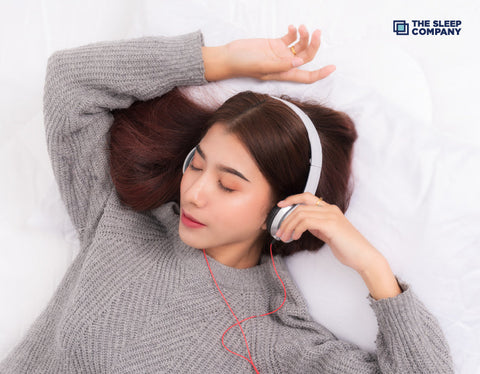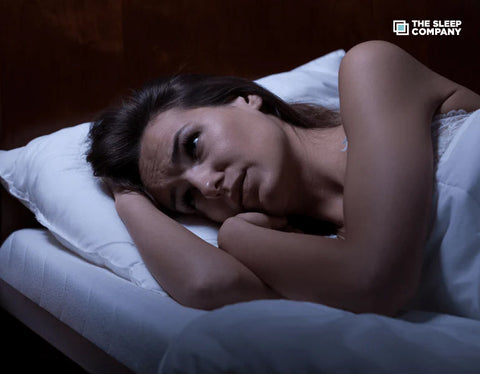My Cart

Are You Oversleeping? Here’s Why And How To Fix It


Have you ever missed your work because you slept those extra hours in the morning? Well, it happens with everyone at some point in life, and it’s not that big a problem. However, sometimes, we find an increased number of oversleeping scenarios in our lives too frequently, which can be considered the problem and that is too serious.
Most of the time, we put all the blame for oversleeping on the plush and soft mattress and the cold weather. However, sometimes it’s not just the case, and there could be many other hidden reasons that can cause you to oversleep.
The right amount of sleep age wise
Though sleep is an essential factor in our life for a productive and quality life, it is also important to consider how much sleep we need every day to ensure that we don’t have sleep debt or oversleep, which can hinder sleep quality.
Thus, an average sleep for us is divided according to age groups, such as
New-borns
New-borns between the age group 0 to 3 months old require most of the sleep for their substantial growth, and thus they sleep for a maximum of 14 to 17 hours a day.
Infants
Just like new-borns, infants between the age group of 4 to 12 months sleep most of the day; though they don’t sleep continuously like new-borns, they sleep peacefully at night and nap during the daytime. Infants require around 12 to 16 hours of sleep, including nap times.
Toddlers
Toddlers between the age group 1 to 2 years start to sleep more like adults, and also it’s the age group when they start learning new things such as walking, talking and playing, which further decreases their sleeping hours to 11 to 14 hours, including nap times.
Preschool
Pre-schoolers or the age group 3 to 5 years when their schooling activities begin reduces their sleep time, and sleep required at this age is around 10 to 13 hours, including naps.
School-age
As the kids enter the school age or 6 to 12-year group, their time on mattress reduces and time for activities like school, homework, and playing increases. Thus, school kids’ sleep required at this age is around 9 to 12 hours per day.
Teenagers
As kids enter the teenage or 13 to 18 age group, their sleep almost becomes like a young adult, and sleep required at this age is around 8 to 10 hours a day.
Young adults
Young adults or the 18 to 25 age group are most active in developing their career and spend most of the time working hard for it; thus, sleep required at this age is around 7 to 9 hours a day.
Adults
Adults or the 25 to 64 years’ age group is the responsible age group and shoulder not only their own but family and other responsibilities as well and work more hours. Thus, sleep required at this age is around 7 to 8 hours daily.
Old adults
Old adults or the 64 and above age group is the retired one who starts sleeping less and less as they age. However, the sleep required at this age is around 7 to 8 hours daily.
Major causes for oversleeping and solutions

If any of these age groups frequently sleep more than the required hours for their age group, then it’s called oversleeping, and there could be many reasons that can cause it.
Such as,
1. Workload
We often tend to work extra hours to finish big projects or study for the next day’s exams, ultimately sleeping less and creating sleep debt. When we try to catch sleep to make up for sleep debt, Oversleeping can occur.
Excessive workload may cause sleep debt, and when we try to make it up for sleep debt by sleeping extra hours, oversleeping can occur
2. Fatigue
Due to various reasons, fatigue or tiredness can occur, which further demands oversleeping.
3. Health disorders
Health disorders such as heart diseases, obesity, chronic pain, diabetes, and hyperthyroidism may weaken you, and thus you begin oversleeping
4. Sleep disorders
Sleep disorders like sleep apnea, narcolepsy, and idiopathic hypersomnia, can make you oversleep
5. Mental health disorders
Mental health disorders such as anxiety, depression, or stress may make you oversleep
6. Medications
Sometimes medications affect your health, resulting in tiredness and sleeping desires. Also, many medicines contain chemicals which make you sleepy and require you to sleep for them to work better, thus resulting in oversleeping
7. Addiction
Consumptions such as alcohol, drugs, and other nicotine products may make your brain signals and circadian rhythm making you oversleep
Impacts of oversleeping

Oversleeping or long sleep can cause you not just lost hours of productivity, but it affects many things, such as
- weariness and a lack of energy
- Immune system dysfunction
- Nervous System Changes
- The risk of chronic illnesses such as cardiovascular problems, diabetes, and obesity
- Elevated risk of death
How to diagnose oversleeping?
The easiest and simplest way to diagnose oversleeping is to count the hours you spent sleeping every day and then tally it with the chart mentioned above according to your age group. If you spend more hours than required for your age, you are oversleeping.
Other ways to diagnose whether you are oversleeping are
- Problems with productivity.
- Low energy levels during the day.
- Anxiety manifestation.
- Memory crises
- Napping does not cure extreme drowsiness.
- An extreme weariness that is unaffected despite additional sleep
- Tips to overcome oversleeping
Tips to overcome oversleeping

When a medical condition causes your oversleeping, seeking medical advice may help you sleep regularly again. Also, making lifestyle modifications to address poor sleeping habits may be beneficial.
Thus, here are some useful tips to overcome the habit of oversleeping:
1 . Have a sleep schedule
Try to sleep and wake up at the same time every day, including weekends and holidays. It helps your body grow acclimated to the thought of sleeping during that time and eventually helps you develop a pattern and sleep effortlessly.
2. Create ideal sleep surrounding
Your surroundings work wonders to help you achieve quality sleep and reduce oversleeping. Make sure that your bedroom is dim-lighted or dark when you sleep, as your circadian rhythm gets signals to sleep when it goes dark. Create a peaceful atmosphere in your bedroom as noises disturb your brain and keep it active.
Keep your bed neat and clean with a comfortable and supportive mattress which will help you get adequate sleep. Don’t use old and damaged mattresses as they may create sleep issues. If your mattress is old or damaged, then you can buy the Sleep Company’s SmartGrid mattresses, which come with the patented Japanese grid technology to help you improve sleep quality.
3. Avoid screen time
Blue light is emitted by computer and phone screens. This light can interrupt your body’s normal circadian cycle and impair sleep at night. Turn off your gadgets and minimize your exposure to blue light a few hours before bed.
4. Mind lifestyle habits
Take care of yourself by maintaining a proper lifestyle. Consider the products you use, like gadgets emitting harmful radiation that can affect your brain cells and circadian rhythm.
Try to maintain healthy food habits by avoiding oily and fatty food. Avoid excessive consumption of caffeine and alcohol, which can harm your health.
Stay active by performing exercise every day for 30 to 60 minutes.
5. Keep sleep diary
If you have any problems or concerns related to sleep or other daily problems, write about them. Maintain a sleep diary and write your thoughts before going to sleep, which will help your brain to calm down and relax.
Conclusion
Though oversleeping may result from inescapable reasons, one may overcome it with some discipline and the tips mentioned above.
































































